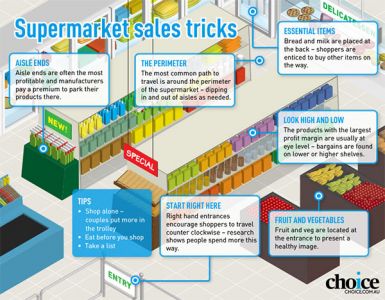Life Skills: Finance - Shopping tips

This page is going to be all about those tricks we learn throughout our lives to try to stop ourselves from buying more than we wanted or even needed when we are out and about.
Let's face it we have all at one point or another nipped to the supermarket or the local shop for a couple of items and then before we know it, we have either a full trolly or bag of extra items. Beware, this is no mistake. In fact, a lot of this is due to marketing techniques that have been designed to get you to buy extras you didn't want before coming into a shop, whether its a bar of chocolate or a new jumper, yoghurts, a new household appliance. Most shops are designed and laid out in a particular way to make you see, smell and hear things that make you want to spend more money.
To prove this point I want you to try to remember the last time you were in a supermarket (Morrisons, Tesco, Asda, Sainsbury's). What was the first thing you saw when you walked into the store? I bet it was the fresh fruit and veg and the milk was probably in the middle of the shop at the back right? No, I'm not psychic and I haven't mapped every supermarket in Scotland. Very simply every supermarket is laid out this way. The reason? Well, the fresh fruit and veg at the entrance give a good impression of a store. The milk and bread are located further in the store so you have to walk past all of the "offers" which many of us just can not resist.
Want to learn a bit more about all the tricks supermarkets use to get us to spend more? Check out this link from BBC
The main tip to reduce spending when going on a food shop... Eat before you go! You will be surprised to see how that reduces your spending on food and snacks
Now don't be fooled, it isn't just the supermarkets that tricks you to spend more, in fact, most shops use a trick or two. For example Primark, the checkouts are surrounded by the new in season, accessories, and shoes, so when you are trying to get to the till you will be encouraged to pick up extra items to complete your outfit. The major problem? In 6-18 months, they will no longer be wearable and this is often referred to as fast fashion, and it is expensive and costs more than slow fashion. Interested to know more about fast fashion and the impact on the environment? Check out this article
How do you beat the system designed to make you spend more?
- Remind yourself of how they try to trick you, knowledge is power!
- Set the maximum you want to spend before going into a shop. A great way to achieve this is to withdraw cash and add up the cost as you shop using a calculator on your phone but in these strange times for Health and safety, we recommend not using cash for transactions.
- Make a shopping list - this way you can plan out your meals and also reduce your food waste, see more below
- Try online shopping. Online food shopping allows take your time and make sure you buy exactly what you need from the comfort of your own home.
- Try out the 30-day rule. For example, you are in a shop and you see an item you feel the urge to buy, it's a it random, but instead of buying it then and there, walk away and if you are still thinking about it 30 days later you can come back and decide it you want to buy it.
- Make a weekly food plan. Decide what meals you want to make ahead of time and buy in the right amounts of ingredients for those meals. Thousands of pounds are wasted by households each year on food they have bought and never ate. You will find that some recipes use the same ingredients, these are called staple ingredients so maybe try to find recipes that use a lot of the same ingredients to save more.
- Check out our guide to reducing your food waste and incorporate change into your life both for the sake of your spending and for the environment.
- Slow Fashion is not only better for your budget but is good for the environment also. For more information please refer to our beginners guide to ethical consumerism.
Note: ECSA is not a financial advice service, and we do not provide financial advice. The purpose of these pages is to give you a brief introduction to some of the information available and provide a basic understanding of the topic. Please use the information in these pages as a starting point to help give you a clear direction for doing your own research.
Financial Services:
https://www.moneyadviceservice.org.uk/en
Phone: 0800 138 7777
WhatsApp: +44 7701 342744
https://www.nationaldebtline.org (over 25)
Phone - 0808 808 4000
Webchat Avilable
Monday to Friday: 9am - 8pm,
Saturday: 9:30am -1pm
